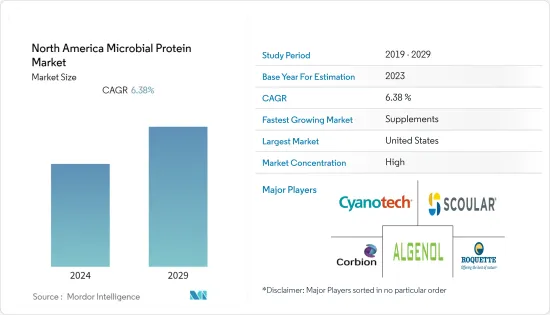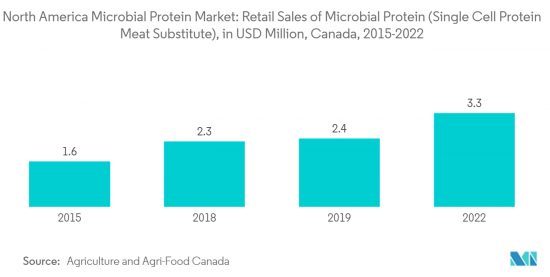PUBLISHER: Mordor Intelligence | PRODUCT CODE: 1406927

PUBLISHER: Mordor Intelligence | PRODUCT CODE: 1406927
North America Microbial Protein - Market Share Analysis, Industry Trends & Statistics, Growth Forecasts 2024 - 2029

The North America microbial protein market was valued at USD 12.4 million for the current year and is projected to register a CAGR of 6.38% over the next five years.
Key Highlights
- Microbial protein-based food products like functional drinks, such as those containing chlorella or Spurilina, are gaining popularity around the region due to their health advantages and pleasant flavor. Food fortification innovations and new findings on the health advantages of certain nutrients are driving this market segment. For instance, United States-based company Cyanotech offers spirulina and claims the ingredient to be a highly absorbable source of protein with essential amino acids, iron, beta carotene, minerals, and other healthful vitamins, including B-vitamins and phycocyanin, a pigment-protein antioxidant complex found only in blue-green microalgae.
- Additionally, the increasing number of investments in the microbial protein market, like the algae protein market space, directly results from the rising demand for protein alternatives. Also, the shift in consumer demand from animal protein to other protein sources can clearly be witnessed with the rise of the protein alternative market. This gradual inclination toward plant-based and microalgae-based diets is largely associated with different factors, such as sustainability issues, health awareness, ethical or religious views, and environmental and animal rights.
- Many kinds of microbial proteins, like algae, produce a great protein production per unit of land, which is why they are being looked at more and more as a potential solution to the protein problem. As per researchers, spirulina algae, which contains between 60 and 71 grams of protein per 100 grams, is used in a wide range of functional foods and drinks due to its high protein content. Furthermore, spirulina has been declared GRAS by the European Food Safety Authority (EFSA), the Food and Drug Administration (FDA), and other prestigious food regulatory authorities, and its popularity as a functional food is rapidly expanding.
North America Microbial Protein Market Trends
Increasing Efforts to Improve Extraction and Cultivation of Microalgae to Boost the Market Growth
- Algae-based meals and supplements keep getting press and attention because of their purported health benefits. Many kinds of food and drink can benefit from the addition of algal biomass. The companies that are planning to cultivate, prepare, and commercially distribute algae as a valuable nutritional source will be pioneers who pave the way for considerable value creation in the market for meat alternatives.
- New sources of algae proteins have been coming up in the market recently. Microalgae, a source rich in protein, omega, and beta-carotene, have gained immense popularity among manufacturers as a sustainable source of food and fuel. For instance, the Bioconversion of Algal Carbohydrates and Proteins to Fuels project handled by Sandia National Laboratories (multimission laboratory managed and operated by National Technology & Engineering Solutions of Sandia, LLC, a wholly-owned subsidiary of Honeywell International Inc., for the US Department of Energy's National Nuclear Security), is meant to provide the technical means to surmount current limitations for conversion of algae biomass to fuels and bioproducts by efficient utilization of proteins and carbohydrates, which are the dominant components of algae biomass at high growth rate.
- The project is expected to reduce the overall cost associated with microalgae cultivation, thus allowing the technology to be competitive and a durable alternative in the marketplace. Currently, the available microalgae cultivation methods are expensive. However, the project aims to reduce the production cost to USD 900/tonne using new technologies, such as biocatalyst cultivation procedures. Thus, the increasing efforts to improve the extraction and cultivation of microalgae are expected to boost market growth.

United States Holds the Major Share in the Market
- The regional microbial protein market was primarily driven by the United States and its rising demand for alternative proteins. The rising awareness regarding healthy and sustainable foods led to an increase in the demand for plant or microbial protein-based meat alternatives in the country. Moreover, the popularity of food products with the label 'free from' has encouraged consumers to adopt a 'clean living' with healthy dietary preferences.
- The emerging protein gap is building opportunities for new sources, such as single-cell organisms and microalgae, including spirulina and chlorella. For instance, as per Plant Protein Co., 6% of United States consumers identified themselves as Vegans in 2023, which represents a 6 times increase since 2014.
- Additionally, factors like less environmental impact, year-round availability, and more protein concentration give microbial proteins an upper hand over conventional protein sources. The country has the largest concentration of companies involved in fermentation for alternative protein applications, which projects the country as a potential leader in the market.
- For instance, Kuehnle AgroSystems, a Hawaii-based algae ingredients-producing company, announced the allowance of its patent for producing microalgal proteins and other products by culturing Chlamydomonas microalgae via dark fermentation. As per the company, its patented process covers the production of additional ingredients for adding color, flavor, and vital nutrients that can be used for plant-based meat and seafood, such as hemoproteins and selenoproteins, produced by members of the Chlamydomonadales.
North America Microbial Protein Industry Overview
The North America microbial protein market is consolidated, with major players in this market including Algenol Biotech LLC, Corbion NV, Cyanotech Corporation, Roquette Freres S.A., and the Scoular Company. Emphasis is given to the merger, expansion, acquisition, and partnership of the companies along with new product development as strategic approaches adopted by the leading companies to boost their brand presence among consumers, as the market appears niche to the majority of the consumers in the region. Further, market key players are also planning to strengthen their distribution relationships with firms across various regions by merging or acquiring to leverage the customer base for any future product launches.
Additional Benefits:
- The market estimate (ME) sheet in Excel format
- 3 months of analyst support
TABLE OF CONTENTS
1 INTRODUCTION
- 1.1 Study Assumptions and Market Definition
- 1.2 Scope of the Study
2 RESEARCH METHODOLOGY
3 EXECUTIVE SUMMARY
4 MARKET DYNAMICS
- 4.1 Market Drivers
- 4.1.1 Increasing Efforts to Improve Extraction and Cultivation of Microalgae to Boost the Market Growth
- 4.1.2 Growing Demand for Meat Alternative Protein Sources in the Region
- 4.2 Market Restraints
- 4.2.1 Competition from Other Protein Sources
- 4.3 Industry Attractiveness - Porter's Five Forces Analysis
- 4.3.1 Bargaining Power of Suppliers
- 4.3.2 Bargaining Power of Buyers/Consumers
- 4.3.3 Threat of New Entrants
- 4.3.4 Threat of Substitute Products
- 4.3.5 Intensity of Competitive Rivalry
5 Market Segmentation
- 5.1 Protein Type
- 5.1.1 Algae Protein
- 5.1.2 Mycoprotein
- 5.2 Application
- 5.2.1 Food and Beverages
- 5.2.1.1 Meat/Poultry/Seafood and Meat Alternative Products
- 5.2.1.2 Dairy and Dairy Alternative Products
- 5.2.2 Dietary Supplements
- 5.2.3 Pharmaceuticals
- 5.2.4 Animal Feed
- 5.2.1 Food and Beverages
- 5.3 Country
- 5.3.1 United States
- 5.3.2 Mexico
- 5.3.3 Canada
- 5.3.4 Rest of North America
6 Competitive Landscape
- 6.1 Most Adopted Strategies
- 6.2 Market Share Analysis
- 6.3 Company Profiles
- 6.3.1 Algenol Biotech LLC
- 6.3.2 Arizona Algae Products LLC
- 6.3.3 Corbion NV
- 6.3.4 Cyanotech Corporation
- 6.3.5 ENOUGH (3F BIO Ltd)
- 6.3.6 Kernel Mycofood
- 6.3.7 Mycorena AB
- 6.3.8 Roquette Freres S.A.
- 6.3.9 The Scoular Company
- 6.3.10 Agrial Group
7 MARKET OPPORTUNITIES AND FUTURE TRENDS




